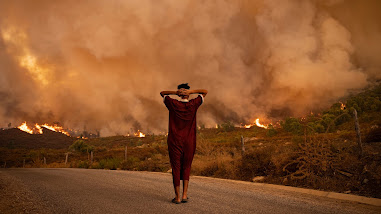
Global warming is a critical issue with far-reaching implications for our planet, ecosystems, and human society. Here are some important of key importance:
Climate Change: Global warming is primarily caused by the increase in greenhouse gases like carbon dioxide (CO2) in the Earth’s atmosphere, mainly due to human activities such as burning fossil fuels and deforestation. This leads to a rise in global temperatures, altering weather patterns, increasing the frequency and intensity of extreme weather events like hurricanes, droughts, and heatwaves.
Why we Need Is Global warming Important And The Tribal Climate Camp
Impact on Ecosystems: Rising temperatures and changing weather patterns disrupt ecosystems worldwide. This affects biodiversity, habitats, and the distribution of species, leading to species extinction, altered migration patterns, and disruptions in food chains. Coral reefs, polar regions, and tropical forests are particularly vulnerable.
Water Resources: Global warming affects the water cycle, leading to shifts in precipitation patterns, melting glaciers and ice caps, and rising sea levels. This impacts freshwater availability, agricultural irrigation, and the frequency of floods and droughts, posing risks to human communities, agriculture, and ecosystems.
Human Health: Climate change exacerbates health risks, including heat-related illnesses, respiratory problems from air pollution, vector-borne diseases like malaria and dengue fever spreading to new areas, and food and waterborne diseases due to contaminated water sources and disrupted food systems.
Economic Impacts: The consequences of global warming have significant economic costs, including damage to infrastructure from extreme weather events, loss of agricultural productivity, decreased fisheries yields, increased healthcare costs due to climate-related illnesses, and the displacement of communities due to rising sea levels.
Social Justice: Global warming disproportionately affects vulnerable communities, including low-income populations, indigenous peoples, and marginalized groups. These communities often have limited resources to adapt to climate change impacts and are more exposed to environmental risks.
Global Security: Climate change can exacerbate existing social, political, and economic tensions, leading to conflicts over dwindling resources such as water and arable land. It also increases the risk of mass migrations as people are forced to leave areas rendered uninhabitable by climate-related disasters.
Mitigation and Adaptation: Addressing global warming requires concerted efforts to mitigate greenhouse gas emissions through transitioning to renewable energy sources, improving energy efficiency, protecting and restoring forests, and implementing sustainable land-use practices. Adaptation measures such as building resilient infrastructure, improving disaster preparedness, and enhancing agricultural practices are also crucial to cope with the impacts of climate change.
In summary, addressing global warming is essential for safeguarding the environment, protecting human health and well-being, promoting social equity, ensuring economic stability, and maintaining global security.









